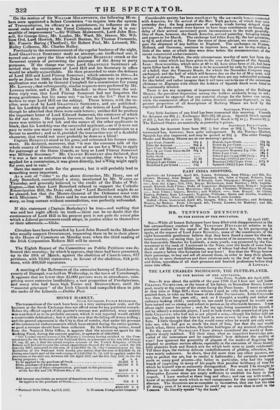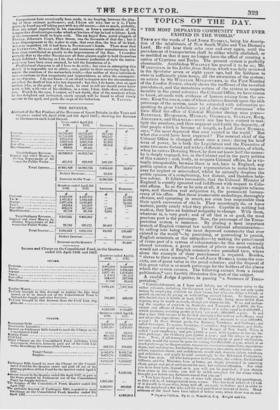THE LATE CHARLES NICHOLSON, THE FLUTE-PLAYER.
TO THE EDITOR OF THE SPECTATOR.
Stoke Ferry. Norfolk, 4th A pril 1837. SIR—It was about the middle of the year 1799 that I first saw and knew CHARLES Nicaotsow, at the house of his father, in Brownlow Street, Liver- pool, nearly at the corner of the street facing the Poor-house. I went to sailed at that time at Edge Hill ; from whence I used to sally forth, on certain ap- pointed days, to take my flute lesson of the elder NICHOLSON. Little CHARGES was then about five years old ; and, as I thought, a weakly and rather an ordinary-looking child ; certainly no one could have imagined he would ever have turned out so strong and robust in person as lie afterwards became. I was about eight years his senior ; and, for my age, being accounted (by myself, if not by others) a tolerable player, I used to look down with somewhat of pity on little CHARLEY, who had not as yet played a note,—though his father told me one day, he meant to take him in band as soon as ever he was able to hold a flute. I little thought that the day would conic when he would not only over- take me, who had got so much the start of him, but that the son would finish what, thirty years before, the father had begun of my musical education. To the name of NICHOLSON I have always considered the world of flute. players deeply indebted. Till their time, what an imperfect knowledge pre- vailed of the instrument and its capabilities ! how deficient the quality of time! how ignorant the generality of players of the modes of fingering beet adapted to produce certain effects, especially in the execution of those beauti- fully plaintive Irish and Scotch airs for which both were so justly celebrated! Till their days, the various delicate embellishments of gliding, vibration, &c. were nearly unknown. In short, they did more than any other masters, not only to perfect the art, but to render it fashionable ; fur certainly none ever made so many good players—the father in particular, who had the happy knack of imparting to many of his pupils that peculiar brilliancy of tone for which he himself was so eminently distinguished. Nor would I be thought to detract in the smallest degree from the merits of the son as it teacher. His Preceptive Lessons alone are amply sufficient to establish his fame in that respect. I have worked at them long and often ; and can say with truth, I know of no similar work which so well compensates for the master's personal absence. The directions are so complete in themselves, that one has the idea all along; even if he were present he could say no more than is said in the Lessons. He literally speaks" by the husk."
Comparisons have occasionally been made, in my hearing,' between the play- ing of these eminent performers; and, I know not why, but so it is, I have genera
ly found myself taking part with my old master,-not so much, probably, from any actual superiority in his execution, as from a consideration of the comparative disadvantages tinder which at his time of day he had to labour. Look at the instrument itself, to begin with. The six- keyed .flute, metal-plugged, of POTTr a, Johnson's Court, Fleet Street, was the favourite of that day ; but it is no disparagement to the maker to state, that even this, the best of its kind, was wry imperfect, till it had been in NICHOLSON'S hands. There were then no CLYSIENTIS, RVDALL and Roses, and numerous other manufacturers, who hive since contributed so greatly to the improvement of the flute. I therefore contend; that to the elder NICHOLSON all flute-players ought to hold themselves deeply indebted ; believing as I do, that whatever perfection of style the instru- ment may have been since attained, he laid the foundation of it.
Professional character is all I have to do with ; but even in attempting this sketch it is impossible not to admit,-nay, justice to their surviving family de- mands the assertion of the melancholy truth,-that neither of these individuals woe exceptions to that irregularity and improvidence so often the accompani- ments of genius. I do not know-I am afraid to inquire into the circumstances attending the death of him who last departed ; but this I do know, that an aged mother, who, in the pride of his heart, he used to tell me should never know want, is left, with two of his children, in a state, I fear, little short of destitu- tion. If such be the case, I cannot, wi l not doubt, that of the numbers whom he has delighted and instructed, surely enough will be found to afford timely
succour to the aged, and guide the steps of the fatherless. S. Tar LOR.



























 Previous page
Previous page